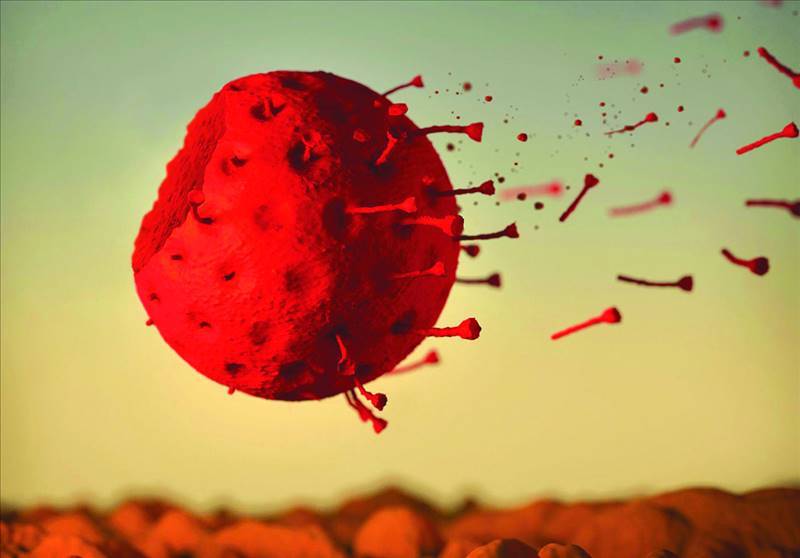
Many people believe, and continue to believe, that the COVID-19 pandemic was a conspiracy by the USA, China, Big Pharma, Big Finance, Bill Gates, or some mix of all of these. Many others preferred apocalyptic theories. A much abused nature, fed up with the shenanigans of human beings, taking back the planet. For most people, the explanation of choice had little to do with an objective assessment of available evidence, a comparison on alternative explanations, or a rigorous argumentation process. Rather it appeared to link to much deeper emotions such as feelings of impotency and powerlessness, fear of illness and death, and guilt – guilt at living in a hedonistic society, in violent disregard for basic moral and environmental norms.
But is there a more objective lens through which we can look at the pandemic? Maybe. But we first need to drop our human-centered view of things and stop thinking that we are the masters of the world.
Humans are a very new arrival on the planet earth. If the earth’s history of some 4.5 billion years was represented by 24 hour clock, humans arrived only one minute before midnight. Modern man came even later – a few seconds before midnight. In contrast, bacteria made their first appearance some 3.5 billions of years ago; viruses and protozoa some 1.5 billion years back. For most of its history, earth has been a battleground for survival among these microorganisms. Their main strategy, given their very limited capacity to influence their environment, has been to reproduce as fast as possible and mutate rapidly to any available environmental niches.
As more complex organisms such as plants, insects, birds, dinosaurs and mammals emerged, the pre-existing bacteria, viruses and protozoa formed symbiotic or parasitic relations with them in order to enhance their chances of survival. But they never dropped their primary survival strategy - that of being able to mutate, adapt and reproduce rapidly.
As humans arrived on the planet some 200,000 years ago, they too were recruited by these microorganisms as hosts. They live on our skin; in our mammary glands, placenta, seminal fluid, uterus, ovarian follicles, biliary tract and lungs; in our saliva and oral mucosa; and in the conjunctiva. In our gastrointestinal tract there are an estimated 500-1,000 species of bacteria. In fact there are so many of these non-human cells on, or inside, our bodies that they outnumber human cells. We are more them than us.

Most of these microorganisms have a beneficial effect – for example, the bacteria in the gut help digest certain foods and synthesize certain vitamins. However, others have also been associated with pathologies ranging from dental plaque to cancers, and even to autism. But in most cases we simply don’t know what role, if any, they play. Most likely we just provide the home that they live in. So asking “What do they do for us?” is like a family asking what benefit does our house derive from us living in it.
Over the millennia our species, homosapiens, driven by greed, curiosity and arrogance, has moved out of our original home in eastern Africa to every nook and cranny of the planet. On our travels we have encountered new organisms. Those that we could see, and we considered our competitors, such as our cousins the Neanderthals, we killed. At the same time, we also learnt to exploit both plants and animals for our use. But as we domesticated dogs, horses, chickens and cows, the microorganisms that lived these animals crossed over into us humans. From horses we got the common cold virus; from poultry we got influenza, chicken pox and shingles; and from cattle we got measles, tuberculosis and small pox. And as humans moved into new environmental niches we encountered the mosquito and we became host to viruses such as that causing yellow fever or to the parasite that causes malaria.
So how does all this help us understand COVID-19 and the virus that causes it? As all viruses it is small and simple; so simple that it cannot even reproduce by itself and needs the help of other organisms to do so. But it is superbly designed to do this, adapting and mutating as needed; always looking for new hosts; and sometimes even making the jump from one species to another. All this does not imply any kind of agency, intention or free-will on the part of viruses. Viruses are what they are, but with survival strategies that have been honed over an inconceivably long period of time. About 7,500 times the period during which humans have lived on the planet.
So basically, much of our history is a constant battle with disease. Some are now familiar and well known such as the virus causing polio, or the protozoa causing malaria. Others are new bacteria or viruses, while yet others are new mutations of old viruses. To some diseases we lose millions – some 2 million every year to malaria alone. In contrast, others diseases such as the common cold are simply irritants.
Yet after each outbreak of a new disease, we recuperate and continue pushing ever further into new environments and new habitats. And so, in the forests of Wuhan we encountered the virus that causes COVID-19; which moved to humans possibly through some intermediate host. Global travel resulted in the virus going global in a matter of months. Looking at the current pandemic in this way suggests that it was almost inevitable. More importantly, if we continue to grow and push into new habitats, as if we have some divine right to do so, we will continue to run the risk of encountering other such diseases.
In the face of this risk we have two choices. Either we learn from this pandemic, as we learnt from other past pandemics, and improve our response strategies; or we try to slow the pace at which we invade the habitats of other species. Most likely we will do neither.
Daud Khan works as consultant and advisor for various governments and international agencies.
Leila Yasmine Khan is an independent writer and editor based in the Netherlands
But is there a more objective lens through which we can look at the pandemic? Maybe. But we first need to drop our human-centered view of things and stop thinking that we are the masters of the world.
Humans are a very new arrival on the planet earth. If the earth’s history of some 4.5 billion years was represented by 24 hour clock, humans arrived only one minute before midnight. Modern man came even later – a few seconds before midnight. In contrast, bacteria made their first appearance some 3.5 billions of years ago; viruses and protozoa some 1.5 billion years back. For most of its history, earth has been a battleground for survival among these microorganisms. Their main strategy, given their very limited capacity to influence their environment, has been to reproduce as fast as possible and mutate rapidly to any available environmental niches.
As more complex organisms such as plants, insects, birds, dinosaurs and mammals emerged, the pre-existing bacteria, viruses and protozoa formed symbiotic or parasitic relations with them in order to enhance their chances of survival. But they never dropped their primary survival strategy - that of being able to mutate, adapt and reproduce rapidly.
As humans arrived on the planet some 200,000 years ago, they too were recruited by these microorganisms as hosts. They live on our skin; in our mammary glands, placenta, seminal fluid, uterus, ovarian follicles, biliary tract and lungs; in our saliva and oral mucosa; and in the conjunctiva. In our gastrointestinal tract there are an estimated 500-1,000 species of bacteria. In fact there are so many of these non-human cells on, or inside, our bodies that they outnumber human cells. We are more them than us.

Most of these microorganisms have a beneficial effect – for example, the bacteria in the gut help digest certain foods and synthesize certain vitamins. However, others have also been associated with pathologies ranging from dental plaque to cancers, and even to autism. But in most cases we simply don’t know what role, if any, they play. Most likely we just provide the home that they live in. So asking “What do they do for us?” is like a family asking what benefit does our house derive from us living in it.
Viruses have survival strategies that have been honed over an inconceivably long period of time
Over the millennia our species, homosapiens, driven by greed, curiosity and arrogance, has moved out of our original home in eastern Africa to every nook and cranny of the planet. On our travels we have encountered new organisms. Those that we could see, and we considered our competitors, such as our cousins the Neanderthals, we killed. At the same time, we also learnt to exploit both plants and animals for our use. But as we domesticated dogs, horses, chickens and cows, the microorganisms that lived these animals crossed over into us humans. From horses we got the common cold virus; from poultry we got influenza, chicken pox and shingles; and from cattle we got measles, tuberculosis and small pox. And as humans moved into new environmental niches we encountered the mosquito and we became host to viruses such as that causing yellow fever or to the parasite that causes malaria.
So how does all this help us understand COVID-19 and the virus that causes it? As all viruses it is small and simple; so simple that it cannot even reproduce by itself and needs the help of other organisms to do so. But it is superbly designed to do this, adapting and mutating as needed; always looking for new hosts; and sometimes even making the jump from one species to another. All this does not imply any kind of agency, intention or free-will on the part of viruses. Viruses are what they are, but with survival strategies that have been honed over an inconceivably long period of time. About 7,500 times the period during which humans have lived on the planet.
So basically, much of our history is a constant battle with disease. Some are now familiar and well known such as the virus causing polio, or the protozoa causing malaria. Others are new bacteria or viruses, while yet others are new mutations of old viruses. To some diseases we lose millions – some 2 million every year to malaria alone. In contrast, others diseases such as the common cold are simply irritants.
Yet after each outbreak of a new disease, we recuperate and continue pushing ever further into new environments and new habitats. And so, in the forests of Wuhan we encountered the virus that causes COVID-19; which moved to humans possibly through some intermediate host. Global travel resulted in the virus going global in a matter of months. Looking at the current pandemic in this way suggests that it was almost inevitable. More importantly, if we continue to grow and push into new habitats, as if we have some divine right to do so, we will continue to run the risk of encountering other such diseases.
In the face of this risk we have two choices. Either we learn from this pandemic, as we learnt from other past pandemics, and improve our response strategies; or we try to slow the pace at which we invade the habitats of other species. Most likely we will do neither.
Daud Khan works as consultant and advisor for various governments and international agencies.
Leila Yasmine Khan is an independent writer and editor based in the Netherlands

